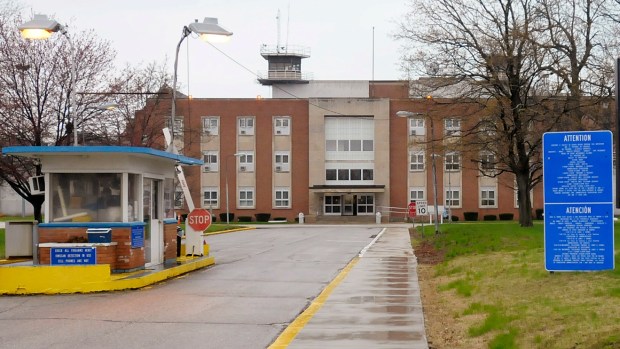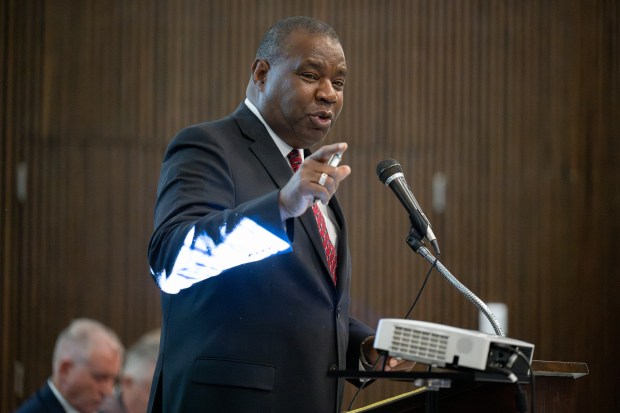As state officials seek to resume executions in Indiana, Lake County’s one death row inmate is still within his appeal process, officials said.
Gov. Eric Holcomb and Attorney General Todd Rokita announced on June 26 that they are seeking to reinstate executions in Indiana prisons, starting with the execution of Joseph Corcoran of Fort Wayne, according to a state news release.
Corcoran fatally shot his brother, James, his sister’s fiance Robert Scott Turner, and two of their friends, Timothy Bricker and Douglas Stillwell, in July 1997, according to the state’s court filing with the Indiana Supreme Court to set an execution date.
A jury found Corcoran guilty of four counts of murder and recommended a death sentence in 1999. Corcoran exhausted his appeals in 2016, according to the release, so state officials are seeking an execution date.
The Indiana Department of Correction recently obtained, after years of effort, pentobarbital, which can be used to carry out executions, Holcomb said in the release.
“In Indiana, state law authorizes the death penalty as a means of providing justice for victims of society’s most heinous crimes and holding perpetrators accountable,” Rokita said in the release. “Now that the Indiana Department of Correction is prepared to carry out the lawfully imposed sentence, it’s incumbent on our justice system to immediately enable executions in our prisons to resume.”
Robin Maher, executive director of the Death Penalty Information Center, said that Indiana hasn’t executed a death row inmate in 15 years, during which time public support for the death penalty has declined.
“The vast majority of states have moved away from use of the death penalty, but Indiana is now inexplicably proposing to do the opposite,” Maher said. “Indianans may reasonably wonder what justifies this sudden policy change, and why there is a new commitment to invest significant resources in a practice most of the country has abandoned.”
Lake County Prosecutor Bernard Carter said he’s glad Holcomb and Rokita are petitioning the court to resume executions.
“You have to send a message, a strong message, to people who engage in certain types of criminal conduct. They have to realize that it’s a realistic situation that they could be charged if they commit certain types of offenses,” Carter said.
In Lake County, Kevin Isom is a death row inmate and is awaiting the completion of his appeal process, Carter said.
Isom used a 12-gauge shotgun with a pistol grip, .357 Magnum revolver and .40 caliber semi-automatic handgun to kill his wife Cassandra, 40, and her children Michael Moore, 16, and Ci’Andria Cole, 13, on Aug. 7, 2007, Carter said.
Isom then barricaded himself in the family’s Gary apartment and shot at police officers ahead of his arrest, Carter said. He told investigators he committed the murders after learning his wife was planning to leave him, Carter said.
Carter said he recently spoke with an official in the Attorney General’s Office and found out that Isom’s case has “one or two more hoops to cross” in the appeal process. It will likely take about one year or two years before the appeal and post-conviction reviews have been completed, Carter said.
“As soon as all his appellate process is exhausted, the attorney general will file with the Supreme Court asking for a date for execution. That will be done pretty much immediately after he exhausted his appellate rights,” Carter said.

Indiana State Prison, pictured on April 23, 2013, in Michigan City houses the state’s death row inmates. (Don Knight/The Herald-Bulletin via AP, File)
As a prosecutor, Carter said he believes in the death penalty for certain crimes committed.
“It’s reserved for the more serious, reprehensible crimes that a person could commit,” Carter said. “When we’re reviewing whether to file the death penalty, it has to be a case of the worst of the worst, and that’s multiple homicides, that’s killing a police officer, killing a child, an elderly person, a home invasion where there are people killed. Those are the kind of cases that I personally look at to see if they qualify for the death penalty.”
When the Indiana General Assembly was crafting language for life without parole, Carter said he shared his support for the statute for instances where crimes are serious but don’t justify the death penalty.
In the past, there have been many botched executions because of secrecy, contaminated or untested drugs, poor staff training and officials unwilling to address the concerns about how executions are conducted, Maher said.
Every study that has been conducted regarding the death penalty, Maher said, has found that the cost of sentencing someone to death and the execution is far greater than the cost of keeping someone in a maximum-security prison for life.
“A sentence of life without parole satisfies the same public safety concerns but is far more cost-effective than use of the death penalty,” Maher said.



